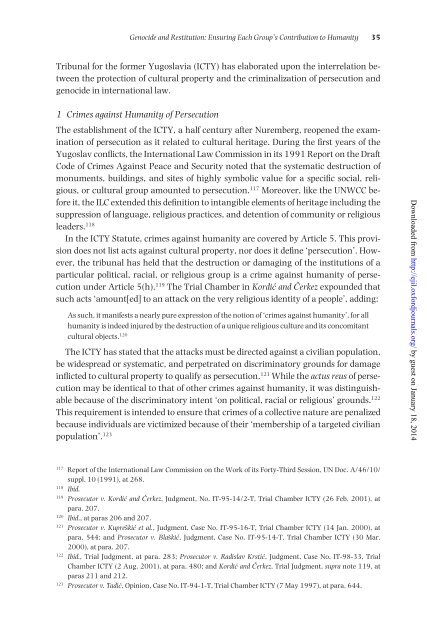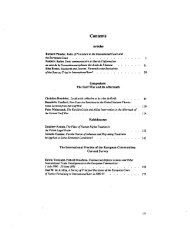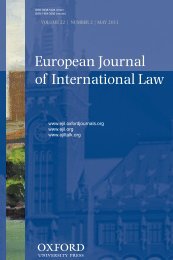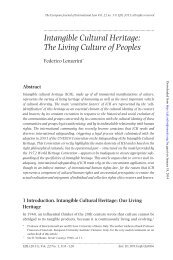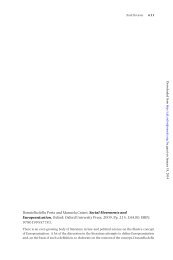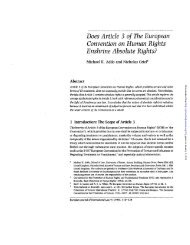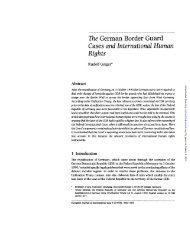Genocide and Restitution - European Journal of International Law
Genocide and Restitution - European Journal of International Law
Genocide and Restitution - European Journal of International Law
You also want an ePaper? Increase the reach of your titles
YUMPU automatically turns print PDFs into web optimized ePapers that Google loves.
<strong>Genocide</strong> <strong>and</strong> <strong>Restitution</strong>: Ensuring Each Group’s Contribution to Humanity 35<br />
Tribunal for the former Yugoslavia (ICTY) has elaborated upon the interrelation between<br />
the protection <strong>of</strong> cultural property <strong>and</strong> the criminalization <strong>of</strong> persecution <strong>and</strong><br />
genocide in international law.<br />
1 Crimes against Humanity <strong>of</strong> Persecution<br />
The establishment <strong>of</strong> the ICTY, a half century after Nuremberg, reopened the examination<br />
<strong>of</strong> persecution as it related to cultural heritage. During the first years <strong>of</strong> the<br />
Yugoslav conflicts, the <strong>International</strong> <strong>Law</strong> Commission in its 1991 Report on the Draft<br />
Code <strong>of</strong> Crimes Against Peace <strong>and</strong> Security noted that the systematic destruction <strong>of</strong><br />
monuments, buildings, <strong>and</strong> sites <strong>of</strong> highly symbolic value for a specific social, religious,<br />
or cultural group amounted to persecution. 117 Moreover, like the UNWCC before<br />
it, the ILC extended this definition to intangible elements <strong>of</strong> heritage including the<br />
suppression <strong>of</strong> language, religious practices, <strong>and</strong> detention <strong>of</strong> community or religious<br />
leaders. 118<br />
In the ICTY Statute, crimes against humanity are covered by Article 5. This provision<br />
does not list acts against cultural property, nor does it define ‘persecution’. However,<br />
the tribunal has held that the destruction or damaging <strong>of</strong> the institutions <strong>of</strong> a<br />
particular political, racial, or religious group is a crime against humanity <strong>of</strong> persecution<br />
under Article 5(h). 119 The Trial Chamber in Kordić <strong>and</strong> Čerkez expounded that<br />
such acts ‘amount[ed] to an attack on the very religious identity <strong>of</strong> a people’, adding:<br />
As such, it manifests a nearly pure expression <strong>of</strong> the notion <strong>of</strong> ‘crimes against humanity’, for all<br />
humanity is indeed injured by the destruction <strong>of</strong> a unique religious culture <strong>and</strong> its concomitant<br />
cultural objects. 120<br />
The ICTY has stated that the attacks must be directed against a civilian population,<br />
be widespread or systematic, <strong>and</strong> perpetrated on discriminatory grounds for damage<br />
inflicted to cultural property to qualify as persecution. 121 While the actus reus <strong>of</strong> persecution<br />
may be identical to that <strong>of</strong> other crimes against humanity, it was distinguishable<br />
because <strong>of</strong> the discriminatory intent ‘on political, racial or religious’ grounds. 122<br />
This requirement is intended to ensure that crimes <strong>of</strong> a collective nature are penalized<br />
because individuals are victimized because <strong>of</strong> their ‘membership <strong>of</strong> a targeted civilian<br />
population’. 123<br />
Downloaded from http://ejil.oxfordjournals.org/ by guest on January 18, 2014<br />
117<br />
Report <strong>of</strong> the <strong>International</strong> <strong>Law</strong> Commission on the Work <strong>of</strong> its Forty-Third Session, UN Doc. A/46/10/<br />
suppl. 10 (1991), at 268.<br />
118<br />
Ibid.<br />
119<br />
Prosecutor v. Kordić <strong>and</strong> Čerkez, Judgment, No. IT-95-14/2-T, Trial Chamber ICTY (26 Feb. 2001), at<br />
para. 207.<br />
120<br />
Ibid., at paras 206 <strong>and</strong> 207.<br />
121<br />
Prosecutor v. Kupreškić et al., Judgment, Case No. IT-95-16-T, Trial Chamber ICTY (14 Jan. 2000), at<br />
para. 544; <strong>and</strong> Prosecutor v. Blaškić, Judgment, Case No. IT-95-14-T, Trial Chamber ICTY (30 Mar.<br />
2000), at para. 207.<br />
122<br />
Ibid., Trial Judgment, at para. 283; Prosecutor v. Radislav Krstić, Judgment, Case No. IT-98-33, Trial<br />
Chamber ICTY (2 Aug. 2001), at para. 480; <strong>and</strong> Kordić <strong>and</strong> Čerkez, Trial Judgment, supra note 119, at<br />
paras 211 <strong>and</strong> 212.<br />
123<br />
Prosecutor v. Tadić, Opinion, Case No. IT-94-1-T, Trial Chamber ICTY (7 May 1997), at para. 644.


